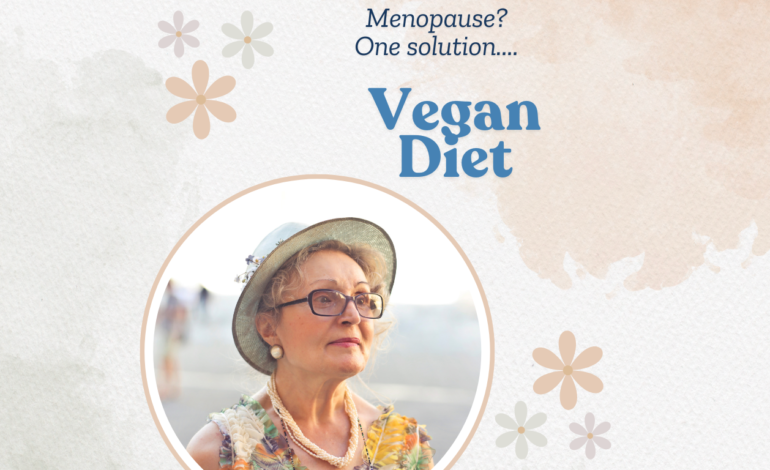The Vegan Menopause Diet Plan by a Dietitian
Introduction Menopause is a natural phase in which no menstrual cycle for at least 12 months and also there is no pregnancy. A well-balanced vegan menopause diet plan can help manage its symptoms, improve overall health, and provide essential nutrients for this transition. Symptoms Its symptoms include: According to research, the average age of menopause is 45-55. It may vary from person to person according to number of children women have or hormonal changes. This article explores the best vegan foods, meal ideas, and lifestyle tips to have menopause with ease. Why Choose a Vegan Menopause Diet Plan? During the menopause or perimenopause stage, women face severe hormonal disturbance and mood swings. Also, a decrease in oestrogen and progesterone levels causes weight gain and an increase in belly fat. So a low-caloric and nutrient-dense food is required. Here are the best features of a vegan menopause diet plan. Low Caloric Meal Plan A daily calorie intake of 1200-1500 kcal/day is recommended for women during menopause. This range may vary because each woman is unique, and factors like activity level, height, age, weight, and lifestyle can affect caloric requirements. Nutrient-dense and Hormone-Balancing Foods A vegan diet rich in whole, plant-based foods provides essential nutrients that support hormonal balance and overall well-being. According to new research, plant-based food rich in soy reduces the menopause symptoms. Reduced Inflammation Plant-based diets are naturally anti-inflammatory, which can help reduce joint pain, digestive discomfort, and other menopausal symptoms. Antioxidants A vegan menopause diet plan includes fruits, vegetables and a fibre-rich diet rich in antioxidants. These antioxidants help to remove free radicals which cause cells to damage. Hence antioxidants protect your body from these hormonal free radicals. Reduce chronic disease Menopause increases the risk of heart disease. Due to a decrease in oestrogen levels belly fat increases. So there is more risk of chronic diseases like diabetes, and heart disease. A vegan diet, which is low in saturated fat and high in fibre, supports cardiovascular health. Essential Nutrients in a Vegan Menopause Diet Plan 1. Phytoestrogens These plant compounds in vegan meal plans mimic estrogen and help reduce symptoms like hot flashes and night sweats. It is said that our body might use phytoestrogens so that estrogen reduces menopause symptoms. 2. Calcium and Vitamin D Essential for bone health, as menopause increases the risk of osteoporosis. According to scientists, after 30 calcium is not stored in our body and after menopause women’s calcium stores decline suddenly. So, it is essential to improve calcium in your diet. Vitamin D helps to absorb calcium and phosphorus. 3. Omega-3 Fatty Acids Support brain health, reduce inflammation, and improve mood. Also, Omega-3 Fatty Acids protect metabolic syndrome which often appears in menopausal women. 4. Protein Maintains muscle mass and supports metabolism which slows down in elderly people. It may be advisable for women in this life stage to consider a slightly higher protein intake. This will be within the range of 1 to 1.2 grams per kilogram of body weight per day (1-1.2g/kg/day). 5. Fiber Supports digestive health and helps in Fat loss. Foods to Avoid 1. Processed Foods 2. Caffeine and Alcohol 3. Excess Sugar Sample Vegan Menopause Diet Plan It is almost a 1200-1300kcal meal plan. which is high in protein, low fat and moderate carbohydrate diet. Breakfast(300-320kcal) Lunch (300kcal) Snack (85-185kcal) Dinner (283-300kcal) Dessert (Optional)(100-120kcal) Recipe of Mint chatney: Add Mint, fennel, dried Pomegranate seeds, cumin seed, black pepper, salt, corriander and grind it properly. Lifestyle Tips for Managing Menopause Along with the Vegan Menopause Diet Plan, You should keep all these tips in your daily routine. Stay Hydrated Drinking enough lukewarm water helps with skin hydration, digestion, and energy levels. Lukewarm water will help to reduce belly fat. Exercise Regularly Incorporate strength training, yoga, and walking to maintain muscle mass and reduce stress. Exercise daily for at least 30 minutes. Get Enough Sleep Practice good sleep hygiene, such as limiting screen time before bed and creating a relaxing bedtime routine. Manage Stress Meditation, deep breathing, and mindfulness can help balance hormones and improve mood. Avoid bakery items Say no to junk food and preserved items. Reduce spices Use more turmeric and black pepper in food and less red chilli powder. FAQs 1. Is a vegan diet good for menopause? Yes! A well-balanced vegan diet can help reduce symptoms like hot flashes, mood swings, and joint pain by providing essential nutrients and reducing inflammation. 2. How much protein do I need during menopause? Aim for at least 1.0-1.2 grams of protein per kilogram of body weight daily. Focus on plant-based sources like lentils, tofu, quinoa, and nuts. 3. Are soy products safe for menopausal women? Yes, soy contains phytoestrogens, which can help balance hormones and reduce menopause symptoms. Choose minimally processed options like tofu, tempeh, and edamame. 4. How can I prevent weight gain during menopause on a vegan diet? Focus on whole, fibre-rich foods, control portion sizes, stay active, and avoid processed foods and excess sugar. 5. What supplements should I consider on a vegan menopause diet? Vitamin B12, vitamin D, calcium, and omega-3s from algal oil are important supplements for optimal health. 6. Does a vegan diet prevent ageing? Yes, according to research a low-fat, whole-food vegan diet helps to reduce the effect of ageing. It reduces the IGF-I growth factor. Conclusion A well-planned vegan menopause diet plan can provide relief from menopausal symptoms, support overall health, and enhance quality of life. By focusing on whole, nutrient-dense foods and adopting a healthy lifestyle, you can enjoy this menopausal stage of life. So, enjoy your journey with your loved ones.
Read More

